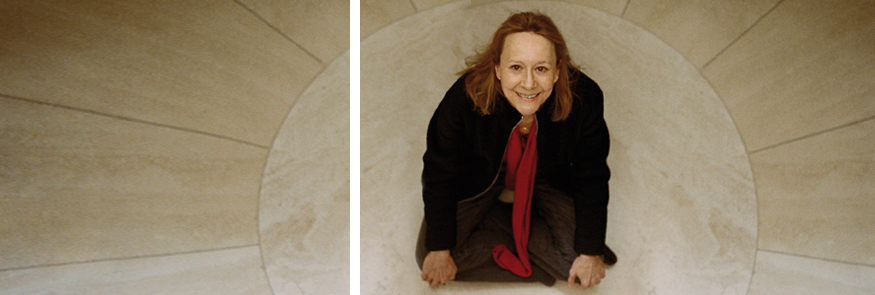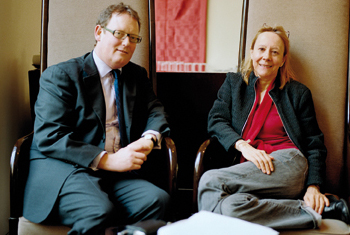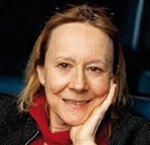“The first thing that engenders trust is transparency.”
Entrepreneur and Internet visionary Esther Dyson on trust and risk in cyberspace

1
Many users have a schizophrenic relationship with the Internet, says journalist, entrepreneur and www-thought-leader Esther Dyson: On the one hand, they say they are paranoid about preserving their privacy and on the other they readily disclose personal data to enjoy the convenience of online shopping or to join a web community. Despite all the risks, Dyson, whose links with the Internet as an astute observer and venture capitalist could hardly be closer, is against more stringent regulation. It’s not the medium that’s to blame for the ugly things that happen online, she argues, but the people who misuse it. The only providers you can trust are the ones that are so transparent you can see the trustworthiness at the other end of the broadband line.
HERE TODAY, gone tomorrow – logging on to Esther Dyson in person is far from easy. But on the other hand the First Lady of the Internet leaves her traces all over the real and virtual worlds. On her stream in the photo community Flickr (www.flickr.com/photos/edyson), for example, she regularly posts photos of the people she meets on her extensive travels and of her encounters with the economic and intellectual elite at events like the World Economic Forum in Davos. One recent photo shows Dom Loehnis from Egon Zehnder’s London office in the restaurant of One Aldwych Hotel, where he spoke with Esther Dyson about the actual and perceived crisis of trust on the Internet.
Those photos on Flickr hold an intriguing mirror to Esther Dyson’s myriad activities. Now 56, Dyson began professional life in the 1970s as a fact checker and reporter for the business magazine Forbes in New York. Starting in the 1980s her monthly newsletter Release 1.0 and her annual PC Forum conference for IT entrepreneurs (both bought from analyst/venture capitalist Ben Rosen in 1983) made her one of the most audible and listened-to voices about the emerging personal computing industry. Unlike some, she then negotiated the transition to play the same role for the commercial Internet in the 1990s.
Never afraid to back a good idea, Esther Dyson also invests in Internet start-ups. She was an early shareholder in the Canadian Flickr photo site, sold to Yahoo! in 2005, and Medstory, sold to Microsoft in 2007. Today her portfolio comprises some 40 fledgling companies, including a stake in 23andMe, which aims to make personal genome analysis an affordable reality.
It’s all a question of risk
Before she supplies her personal data to an Internet service provider, Esther Dyson asks herself a simple question: How big is my risk? “If you’re doing stuff on the Internet it’s not just a question of trust, it’s a question of how big your risk is,” says the daughter of prominent physicist Freeman Dyson and Swiss mathematician Ve-rena Huber-Dyson. “I buy airline tickets for thousands of dollars online all the time. But in this case I’m dealing with a known supplier, and while the risk of my credit card being compromised does exist, it’s a finite risk.”
In Dyson’s opinion, trust can only form when the motives and intentions of the other party in a transaction are transparent: “The world is an uncertain place. The thing that gives you confidence is first of all understanding someone else’s competence – are they really capable of delivering on what they are promising to do? – and then understanding their motivation. For either of those, you need transparency.” When there is not enough information on the table to form an opinion, trust is not likely to enter the equation, she maintains. But Dyson is also aware of the ironic side of the picture: The institutions that users trust most are some of the least transparent of all: banks, hospitals, airlines… “and we regularly entrust them with our money and our lives, without asking all that many questions.” But in most cases, she points out, we do know these operations through personal contact – or at least through others over time.
But for most organizations, if they want to succeed as a service provider on the Internet, Esther Dyson recommends an open approach. “Companies and organizations win trust by providing transparent information, making no secret of their strategies, and being accessible to the wishes and worries of their customers and other stakeholders at any time.” There is really no alternative, she argues, “because in an age of social networking, the activities of a company and the actual quality of its products are not going to stay a secret for long.” On the other hand, transparency and trust must not be allowed to lapse into boundless openness and blind confidence, she warns, particularly when it comes to dealing with users’ private data. Users must understand the risks they are taking and decide for themselves how much they are willing to put at stake.
A voice of warning she may be, but Esther Dyson has little time for the crusades pursued by the self-appointed guardians of privacy against giant data-sponges like Google and the other mega data-hunters and -gatherers on the World Wide Web. “Privacy of data is both over- and underrated,” she says. “In the age of Facebook and other social networking communities, where users voluntarily spread their presence around the globe, people are amazingly paranoid and at the same time amazingly careless with their personal data, and they don’t really understand what’s going on online.”
Where Dyson sees real danger on the Internet, though, is in unfamiliar websites where users land by accident and carelessly click their way around the offerings – an open invitation for badware to download itself onto a hard disk and start mining passwords and credit-card details. “Those malware sites don’t do this for fun,” she warns. “People go off and use that information and then you really are in trouble.”
Faced with the everyday reality of such shock scenarios, Esther Dyson is careful to draw a distinction: “The Internet doesn’t do bad things; it’s people on the Internet and through the Internet who do bad things – some on purpose and some inadvertently.” So she is not likely to side with the online guardians of public morals who advocate subjecting the entire Internet to centralized regulation. The users and institutions on the Net themselves provide an intricate, decentralized system of checks and balances. Drawing an analogy to traffic scenarios, where careless driving leads to thousands of accidents a day, Dyson argues for a shift in perspective: “I’d say that we shouldn’t regulate the cars; but perhaps we should regulate the drivers. Like a car, the Internet is a medium, and the question is: Do you trust the person or institution at the other end?”
Take out user insurance
Spinning the analogy further, she finds the notion of asking users to pay for defense against becoming victim to badware and other Internet plagues – as car drivers pay for insurance – perfectly acceptable. If every user paid their Internet provider R10 a month, she argues, providers could afford to take proper care of security aspects. Alternatively, users who wanted to be responsible for their own Internet security would be required to post the equivalent of a bond of R1,500 in case their computer triggered a security problem for other users. Exactly how this would work would be figured out by clever entrepreneurs, just as in other insurance markets. For example, ISPs could offer to pay the insurance and provide the security in exchange for users’ watching ads.
As the founding chairman of the Internet Corporation for Assigned Names and Numbers (ICANN), a non-profit entity that oversees the Internet’s policies and protocols, Esther Dyson is intimately familiar with the theme of regulating the Net. “ICANN has designed a market with too much regulation and, ironically, too little enforcement,” she comments critically. “There needs to be more disclosure and more real penalties for breaking the rules, but overall fewer rules.” So what did she learn from her work on behalf of ICANN from 1998 to 2000? She doesn’t hesitate for a moment: “Fight harder for transparency. Avoid centralized power. And don’t trust people to do the right thing – design systems that help them do so.”
In our dealings with the temptations of the online world, there is a big difference between the misleading and the deliberately fraudulent, but it’s not always apparent. The overall effect is to leave users basking in the false impression that all they need to know and learn is permanently at their fingertips. Amidst this mass of information the danger is that people forget that they still have to think for themselves. “The internet gives you an illusion of knowledge,” says Esther Dyson. “You can find all this information and texture, but it gives you very little understanding of the underpinnings of things.”
Skeptical about hype
Her healthy skepticism when confronted with hype doesn’t blind Esther Dyson to the blessings of the online world. “The transparency of the Internet fosters efficiency,” she says. “When you see what resources are being used, you get much better at using and allocating them. That is a huge benefit economically, although it doesn’t generally make people more responsible.”
While transparency and efficiency lead to more competitive companies, the Internet has also deprived public institutions of some of their sovereignty and power. The availability of information and the potential ability of every single user to track and comment on current political and social developments diminishes the ability of state institutions to promulgate the “official story,” says Dyson. But here too, she looks on the bright side: “If you give people power, they will mostly use it to do good. They will use it not just to find things out but to change their expectations of what’s available. I ought to be able to know what this government official is doing with my money; or what the reliability of this particular service is, based on other users’ experiences.”
“Precisely because you have the power to do anything, you have to decide what is it you want to do.”
The downside of this democratization of public affairs and knowledge is that not every user knows how to make the most of their new-found freedom. “With the Internet we’re in a world where the little guy can have a completely new kind of reach,” says Esther Dyson. “So for any individual the question is: How far do I want to reach? Precisely because you have the power to do anything, you have to decide what is it you want to do.”
Discipline and discretion
For some users this leads to a situation like that of the newly rich who are seeking a compass for their lives that has nothing to do with money. “For some people it’s very hard and they end up taking decisions that strain their lives, because they have all that freedom but no good sense,” warns Dyson. “The Internet gives people the freedom to – if they so wish – get locked into pornography, or spend all their time on social networking or gaming sites. There’s so much for free that you need a lot of discipline and discretion to focus on something useful.”
On the other hand, companies and institutions have yet to exhaust the opportunities to add value that the Web offers. Esther Dyson sometimes sends e-mails to major companies as a normal customer and is amazed at how often she doesn’t get an answer. Many other meaningful applications are still in their infancy, she believes, and even such basics as website design still have a long way to go. “Sites are often complicated and don’t focus on what an individual might want to do or find out.”
Esther Dyson also sees a strategic error in the blind belief in data that has taken over at some companies. In many cases, they focus exclusively on statistics and can easily lose sight of the personal needs of the individual customer. “I don’t want British Airways to say ‘Hello Mrs. middle-aged white lady;’ I want them to say ‘Oh, hello Mrs. Dyson, welcome back’,” she says. ‘We haven’t seen you since your last trip to Johannesburg.’ That’s recognition of a unique human being, but some companies don’t get it. They’re trying to segment customers into buckets rather than recognize them.”
Individuality and responsibility
It is not just on the Internet that identity, individuality and responsibility are so important to Esther Dyson, but in offline life too. While she is well aware that a personal encounter between two people need not change a trusting relationship built in cyberspace, it is sure to lend additional weight to an undertaking or a promise. – “It’s everybody’s responsibility to understand how the world works and to understand that different people have different points of view. People don’t always do that enough… and it’s often easier to do it face-to-face.”
Esther Dyson likes to savor the best of both worlds, as evidenced by her laptop, which she brought along to the interview, the way most people would a cell phone. Like a well-traveled suitcase in the early 1900s, it has a lid plastered with stickers and building passes. Instead of advertising hotels and shipping lines, these document the interwoven nature of the real and virtual worlds. One of the more recent additions comes from Dopplr, a web community for frequent business travelers that allows members to coordinate their trips and calendars. “That way I can see which of my friends are going to be in London while I’m here and then maybe we can meet for coffee,” says Dyson, who is clearly taken with this travelers’ network, to the extent that she is an investor in it.
So where does Esther Dyson find time for herself? Where she seems to spend most of her time anyway: en route – mainly by airplane. But even there she keeps busy, either working or trying out some trust-building measures: “On an airplane, it’s often enough for someone to be sitting next to you for you to take an immediate dislike to them,” she says. “I remember getting negative vibes from a fidgety older woman next to me until I realized she was simply terrified of flying. I touched her shoulder and said, ‘It’s going to be all right.’ Immediately she calmed down. It was amazing how she trusted me, a total stranger. As for me, that simple human touch was amazing, because now I was sympathetic toward her instead of thinking how annoying she was.”

The interview with Esther Dyson was conducted by Dom Loehnis, Egon Zehnder, London.

Esther Dyson
She calls herself “the Internet’s court jester, a person of no institutional importance who somehow manages to speak the truth and to be heard when and where it matters.” This charming auto-snapshot is, of course, sheer understatement, coming as it does from Esther Dyson, who has long been one of the most influential figures on the IT scene. She was born in Zurich in 1951 and after studying Economics at Harvard she worked as a fact checker and reporter for Forbes magazine. Then the pull of Wall Street lured her into becoming an analyst. In 1983 she purchased the research firm she was working for (Rosen Research) and renamed it EDventure Holdings. Her monthly newsletter Release 1.0 kept an influential audience informed of developments in the IT industry. In March 2005, Dyson sold her company to CNET Networks; she left CNET at the end of 2007. Since then she has continued to make regular appearances on the conference circuit, as well as investing in Internet, healthcare and aerospace start-ups. And while she calls blogs “overrated,” she continues to write one at HuffingtonPost.com. The title harks back ironically to her early days as an observer of digital developments – Release 0.9.
PHOTOS: JÜRGEN FRANK





